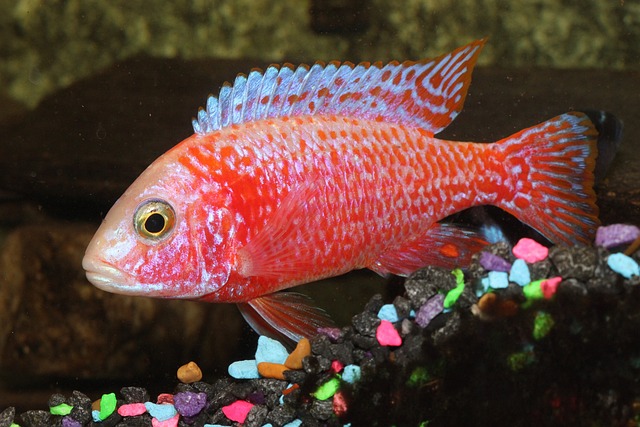There are so many delightful cichlids to choose from for the beauty and enjoyment of your fish tank! However, if you’re looking for even more beauty, you may be wondering what are the 15 best cichlid tank companions?
As an aggressive and territorial breed of fish, cichlids must be kept with tank mates that are similar in temperament and large enough to avoid being eaten, such as Red tailed sharks and Giant Danios.
In this article we will cover the 15 best cichlid tank mates and some FAQs!
Contents
Cichlid Tank Mates – What You Need to Know
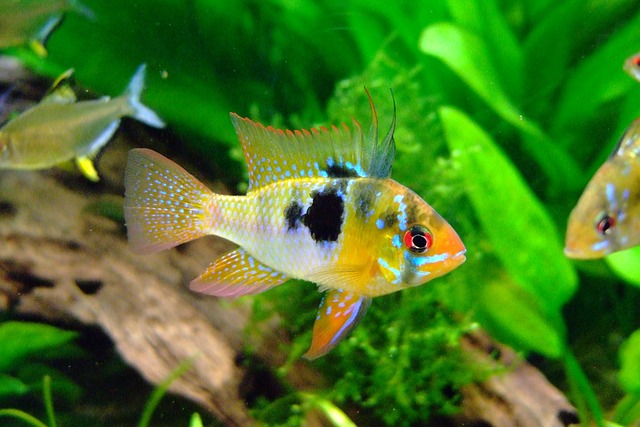
Much like human beings, cichlids have living condition needs and will need to live with fish that give it the proper amount of space and refrain from clashing in tempers! Check out the information below to see what you should consider when you’re picking out tank mates for the cichlid.
Temperament
In general, most cichlids are very territorial and eager to get into fights with fish they think they have a chance of winning against. They may even eat smaller fish. Their infamous tempers have caused some aquarium tenders to simply leave them in tanks alone.
However, it is possible to select tank mates for cichlids; they just need to be of a similar aggressive temperament so that each fish can coexist by knowing that the other won’t be easily pushed around.
Size
Cichlid sizes vary depending on the breed. For example, cichlids on the larger end of the scale can reach 12 inches, while others only manage to max out their length at 2 inches. No matter which breed you select, you need to be sure that whatever tank mate you choose is too big to be eaten.
Once a cichlid sees that another fish is large enough to hold their own in a fight, they will usually give one another space.
Competition
Regardless of the type of cichlid that graces your aquarium, competition for food is likely to be a problem. Because the cichlid is, as we’ve said, territorial, it will definitely try to eat the food of it’s tank mates if it thinks it can get away with it.
The solution to this is to make sure tank mates are fast enough to get to their food first and aggressive enough to avoid being intimidated into starving.
Parameters ; Tank Setup
Just like you or I, living conditions with tank mates need to be similar for there to be health and happiness in your aquarium! In general, cichlids need water temperatures that are at least 76 degrees Fahrenheit, though they thrive between this number and 82 degrees Fahrenheit. Therefore, any tank mates should be comfortable in the same temperature.
Additionally, you need to make sure that your cichlid has plenty of space not only to swim, but to avoid confrontation with other fish. For breeds that are 6 inches long, a 30 gallon tank is necessary, and it is always a good idea to go bigger rather than smaller any time you add tank mates.
15 Best Cichlid Tank Mates
Here are all 15 of the very best tank mates for cichlids!
- Clown Loaches
- African Red-Eyed Tetra
- Siamese Algae Eater
- Giant Danios
- Flying Fox Fish
- Synodontis Catfish
- Rainbow Fish
- Pictus Catfish
- African Butterfly Cichlid
- Leopard Bushfish
- Plecos
- Red Spotted Scat Fish
- Red Tail Shark
- Zebra Loach
- Paratilapia
Let’s look even more closely at each so you get an idea of their needs and what makes them great companions for cichlids.
Other popular posts you don’t wanna miss out!
1. Clown Loaches
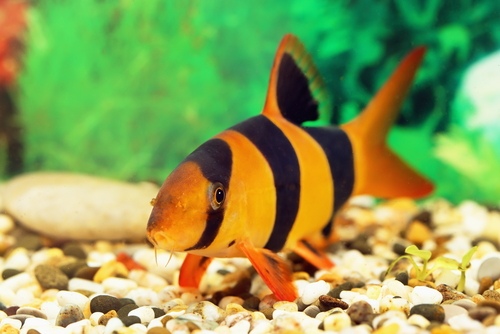
- Scientific Name: Chromobotia Macracanthus
- Adult Size: 7 to 11 inches
- Compatible With: African Cichlids
- Water Temperature: 77-83 F
- Minimum Tank Size: 100 gallons
- Care Level: Medium Difficulty
- Origin: Borneo, Sumatra
One of the best fish to have in a tank simply for entertainment value, Clown Loaches love to play chase and hang out in groups. As long as they are not the only one of their kind kept with cichlids, they can survive just fine as a neighbor.
Pros of keeping with Cichlid:
- Fast enough to compete successfully for food
- Strength in numbers against cichlid aggression
Cons of keeping with Cichlid :
- Must be kept with other Clown Loaches as well as the cichlid.
2. African Red-Eyed Tetra
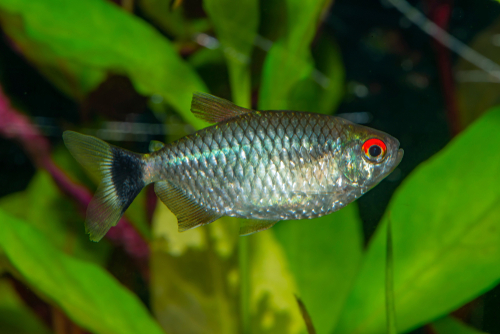
- Scientific Name: Moenkhausia sanctaefilomenae
- Adult Size: 4 inches
- Compatible With: African Cichlids
- Water Temperature: 73 to 82 F
- Minimum Tank Size: 50 gallons
- Care Level: Easy
- Origin: Bolivia, Paraquay, Brazil, Peru, Africa
As long as this beautiful, berry-eyed fish is kept with a cichlid like the African cichlid which is too small to do it harm, it makes a great tank mate. They are incredibly active and prefer being kept with other fish of the same kind.
Pros of keeping with Cichlid:
- If kept with smaller cichlids, there should be no fear of aggression.
Cons of keeping with Cichlid :
- Should not be kept alone with a cichlid.
3. Siamese Algae Eater
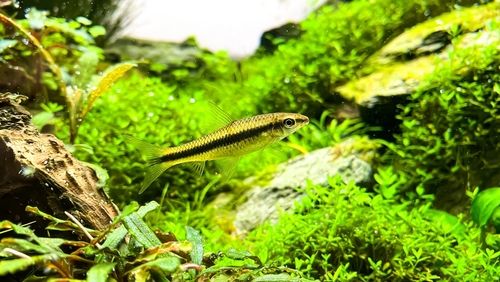
- Scientific Name: Crossocheulus oblongus
- Adult Size: 6 inches
- Compatible With: Small Cichlids
- Water Temperature: 75 to 79 F
- Minimum Tank Size: 30 gallons
- Care Level: Easy
- Origin: Southeast Asia
This fish is peaceful and has the bonus of cleaning up algae in the tank! As long as there is enough room on the bottom of the tank, you should have no trouble with the Siamese Algae Eater and most species of similarly-sized Cichlids.
Pros of keeping with Cichlid:
- Peaceful but large enough to avoid being bullied by cichlids.
Cons of keeping with Cichlid :
- Must be kept with enough room to share space on the bottom of the tank.
4. Giant Danios
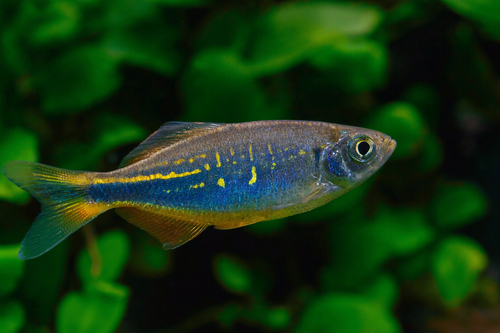
- Scientific Name: Devario aequipinnatus
- Adult Size: 4 inches
- Compatible With: Small Cichlids
- Water Temperature: 72 to 75 F
- Minimum Tank Size: 30 gallons
- Care Level: Easy
- Origin: India, Bangladesh, Nepal, Thailan, Myanmar
With their intense stares and beautiful iridescent colors, these fish love having community with at least six members of their same species. As long as that rule is followed, most cichlids will not attempt to eat any of the Giant Danios.
Pros of keeping with Cichlid:
- When kept in groups, they discourage cichlid bullying.
Cons of keeping with Cichlid :
- If kept alone they can be viewed as prey by larger cichlids.
5. Flying Fox Fish
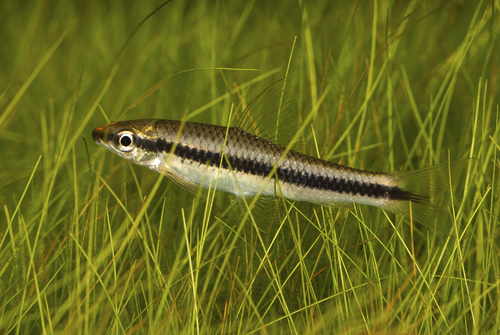
- Scientific Name: Epalzeorhynchos Kalopterus
- Adult Size: 5 to 6 inches
- Compatible With: Small Cichlids
- Water Temperature: 74 to 81 F
- Minimum Tank Size: 55 gallons
- Care Level: Easy
- Origin: Indonesia
Similar in appearance to the Siamese Algae eater other than their beautiful stripes, Flying Fox fish are friendly and peaceful. As long as there are plenty of decorations to duck around and hide in, Flying Fox Fish can peacefully coexist with cichlids while cleaning up the bottom of the tank.
Pros of keeping with Cichlid:
- Can avoid being bullied
Cons of keeping with Cichlid :
- Needs plenty of decorative objects in the tank to interact with.
6. Synodontis Catfish
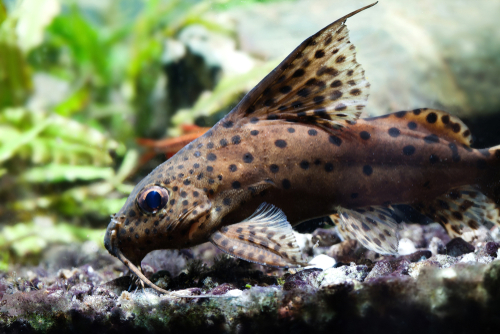
- Scientific Name: Synodontis contractus, synodontis nigriventris
- Adult Size: 8 inches
- Compatible With: Small to Medium Cichlids
- Water Temperature: 72 to 82 F
- Minimum Tank Size: 20 gallons
- Care Level: Easy
- Origin: Malawi, Lake Tanganyika
Spots are definitely in this fashion season! The Synodontis catfish is a beautiful addition to any tank, and their spines double as a protection against cichlid attack. They are not aggressive by nature, so there is little chance of these spines being used in a fight.
Pros of keeping with Cichlid:
- Large enough to avoid being attacked by cichlids.
- Non-aggressive despite their sharp spines.
Cons of keeping with Cichlid :
- None!
7. Rainbow Fish
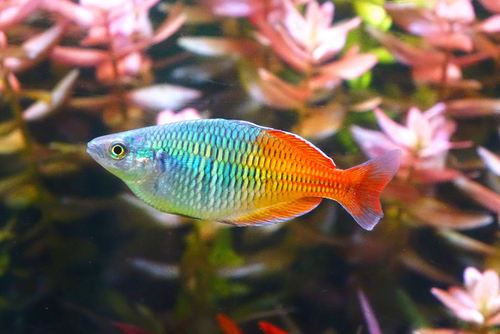
- Scientific Name: Melanotaeniidae
- Adult Size: 2 to 7 inches
- Compatible With: Small Cichlids
- Water Temperature: 74 to 80 F
- Minimum Tank Size: 15 gallons
- Care Level: Medium Difficulty
- Origin: Australia, New Guinea, Madagascar, Indonesia
Beautiful, omnivorous, and energetic, rainbow fish can also withstand the agression of cichlids as long as they are of a similar size. Make sure never to keep a rainbow fish that is still growing in a tank with a cichlid, and give them plenty of room, as they do tend to try and jump out of tanks that are too small.
Pros of keeping with Cichlid:
- Similar size in adults makes them unlikely to be attacked by cichlids.
Cons of keeping with Cichlid :
- Can try to jump out of tanks that are too small.
- Can be eaten by larger cichlids.
8. Pictus Catfish
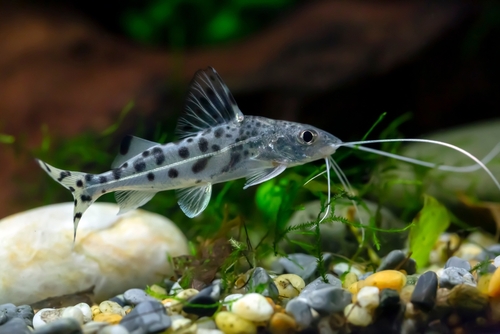
- Scientific Name: Pimelodus pictus
- Adult Size: 5 to 6 inches
- Compatible With: Small Cichlids
- Water Temperature: 74 to 78 F
- Minimum Tank Size: 50 gallons
- Care Level: Easy
- Origin: South America
Pictus Catfish are not only adorable, but they tend to hang out on the bottom of the tank, causing no trouble to most cichlid species. If the cichlid is too small, however, the Pictus Catfish may begin trying to eat it!
On the other hand, if the cichlid is too large, it is the catfish which is in danger. Try getting a catfish similar in size to your cichlid for the best results.
Pros of keeping with Cichlid:
- If of a similar size, both fish will keep to themselves and avoid eating one another.
- Different zones make feeding competition easy.
Cons of keeping with Cichlid :
- Must be of a similar size or someone will get eaten!
9. African Butterfly Cichlid
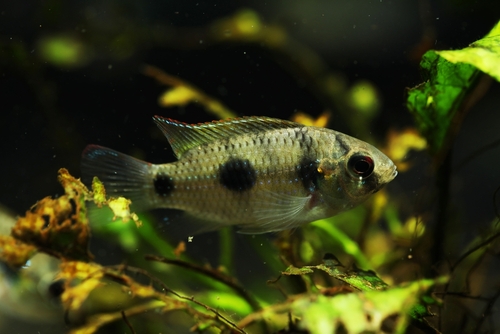
- Scientific Name: Anomalochromis thomasi
- Adult Size: 6 to 8 inches
- Compatible With: Medium to Large Cichlids
- Water Temperature: 73 to 81
- Minimum Tank Size: 20 to 25 gallons
- Care Level: Easy
- Origin: Africa
These tropical-looking fish are cool to watch and easy to care for. As long as they have plenty of room they are very docile and will not start trouble with most other cichlid species!
Pros of keeping with Cichlid:
- Similar in temperament and will not attack fish of a comparable size.
Cons of keeping with Cichlid :
- Will attack smaller fish.
10. Leopard Bushfish
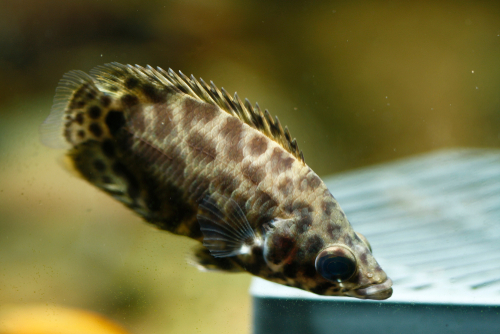
- Scientific Name: Ctenopoma acutirostre
- Adult Size: 6 inches
- Compatible With: Small to Medium Cichlids
- Water Temperature: 73 to 82 F
- Minimum Tank Size: 53 gallons
- Care Level: Easy
- Origin: Congo River
Another beautifully spotted fish, the leopard bushfish is only semi-aggressive, meaning it will not start fights with cichlid, but it will defend itself against the pushy cichlid! It is also a carnivore, meaning that it will be fine competing for it’s own meals.
Pros of keeping with Cichlid:
- Can compete for its own food.
- Large enough to avoid being bullied.
Cons of keeping with Cichlid :
- None!
11. Plecos
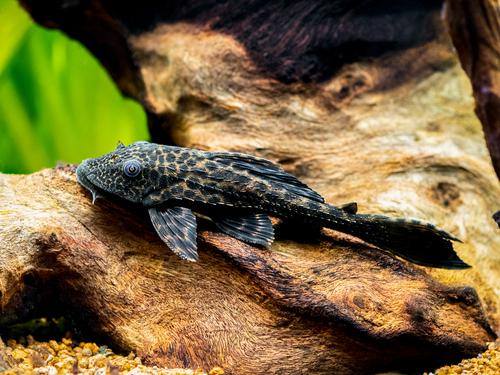
- Scientific Name: Hypostomus plecostomus
- Adult Size: 20 inches
- Compatible With: Medium to Large Cichlids
- Water Temperature: 74 to 80 F
- Minimum Tank Size: 75 gallons
- Care Level: Easy
- Origin: South America
Also called “plecostomus,” plecos are catfish that are big enough to hold their own when confronted by aggressive cichlids. They are a mottled color, making them a pleasing contrast to many more vibrant cichlids.
Pros of keeping with Cichlid:
- Big enough to warn away cichlids trying to pick a fight
- Peaceful enough to avoid starting fights, themselves!
Cons of keeping with Cichlid :
- None!
12. Red Spotted Scat Fish
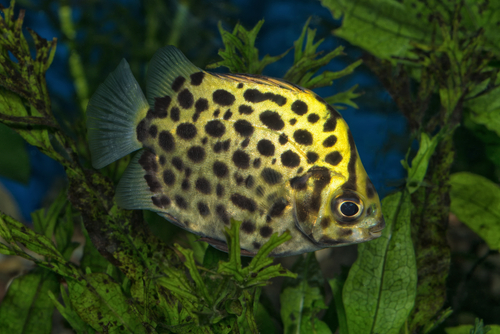
- Scientific Name: Scatophagus argus
- Adult Size: 15 inches
- Compatible With: Large Cichlids
- Water Temperature: 70 to 82 F
- Minimum Tank Size: 60 gallons
- Care Level: Difficult
- Origin: Japan, Australea, New Guinea
Red Spotted Catfish can be kept with cichlids, but it is not always easy. They are saltwater fish that can sometimes survive in freshwater. However, other than this factor, which makes them difficult to care for, they would make great companions for cichlids thanks to size and temperament.
Pros of keeping with Cichlid:
- Can hold their own against most species of aggressive cichlids.
Cons of keeping with Cichlid :
- Difficult to care for due to trying to maintain brackish water for their environment.
13. Red Tail Shark
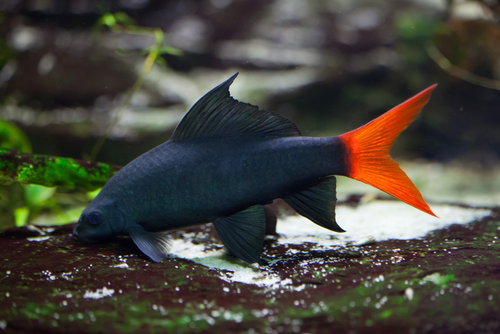
- Scientific Name: Epalzeorhynchos bicolor
- Adult Size: 6 inches
- Compatible With: All Cichlids
- Water Temperature: 72 to 79 F
- Minimum Tank Size: 55 Gallons
- Care Level: Medium Difficulty
- Origin: Thailand
Although this is not an actual sharp, but rather a type of carp, Red Tail Sharks are definitely capable of coexisting with even the most aggressive cichlid species. They, themselves, are very territorial, but as long as you provide them with a cave to call their own, they will keep to themselves.
Pros of keeping with Cichlid:
- Aggressive and large enough to compete for food and avoid getting bullied.
Cons of keeping with Cichlid :
- Must be given a cave to avoid infighting.
14. Zebra Loach
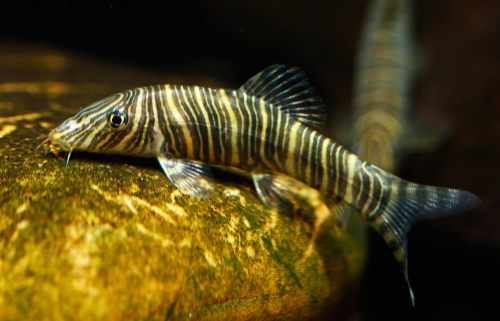
- Scientific Name: Botia striata
- Adult Size: 3 to 4 inches
- Compatible With: Small Cichlids
- Water Temperature: 70 to 79 F
- Minimum Tank Size: 30 Gallons
- Care Level: Easy
- Origin: Western India
Though it is one of the smaller fish on this list and needs to be housed with smaller cichlids to avoid getting smacked on, the zebra loach keeps it itself and will not invite hostility from cichlids. However, be sure to get more than one to keep your zebra loaches happy and healthy.
Pros of keeping with Cichlid:
- Keeps to itself and avoids conflict if sized similarly.
Cons of keeping with Cichlid :
- Can be eaten if smaller than cichlids.
- Must be kept with other zebra loaches.
15. Paratilapia
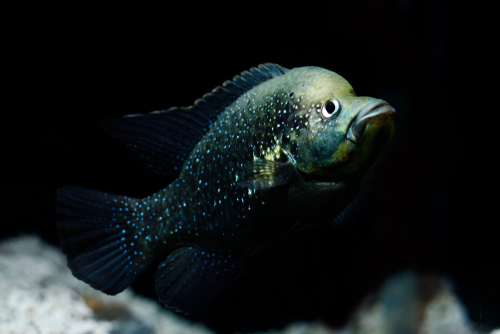
- Scientific Name: Paratilapia polleni
- Adult Size: 5 to 11 inches
- Compatible With: Small to Medium Cichlids
- Water Temperature: 62 to 82 F
- Minimum Tank Size: 55 gallons
- Care Level: Easy
- Origin: Madagascar
The paratilapia is not only a cute but large black fish to add visual depth to your tank, but it is also very adaptable to different water conditions. It is not aggressive toward cichlids, but can be aggressive toward others of its kind.
Pros of keeping with Cichlid:
- Large enough to avoid being bullied by cichlids.
- Peaceful toward fish that are not it’s own kind.
Cons of keeping with Cichlid :
- None!
In Conclusion
In conclusion, the best 15 cichlid tank mates are fish that can handle the rough-and-tumble, bullying temperament of the cichlid without trying to eat them, in turn. This means that large fish like the Red Tail Shark or the Paratilapia are ideal!
Even if you’d like to place fish that are more gentle in nature with your cichlid, it is really size that matters. As long as a fish is large enough or strengthened by multiple of it’s own kind, cichlids can coexist!
Frequently Asked Questions
What kind of fish can you put with Cichlids?
Cichlids can be put in groups with other fish, but almost all species of cichlids are aggressive, territorial, and prone to trying to eat or bully any fish that is smaller than themselves.
Generally, as long as the fish you choose can survive in the same water conditions as a cichlid and happens to be around the same size as the cichlid, you should have very little trouble!
Can Cichlids Be with Other Fish?
Yes, cichlids can be with other fish, such as the paratilapia or the red tail shark. This is because those fish are large enough to discourage pushy cichlids from trying to start a fight, but can also exist in the same conditions healthily.
What can I put in my cichlid tank?
Your cichlid’s tank should have warm water with a high level of pH, while they enjoy sand substrate to dig in. You can also add a variety of caves and plants for a cichlid, as that will break up their line of sight in case they feel like exercising their aggression on other fish.

Ian Sterling, founder of Fishlab.com, began his aquarium journey over 30 years ago, driven by a deep fascination for fish and their diverse personalities. His website, Fishlab.com, is dedicated to making fishkeeping accessible and enjoyable, offering beginner-friendly guidance, expert insights, and a community for aquarists to connect and share experiences.


